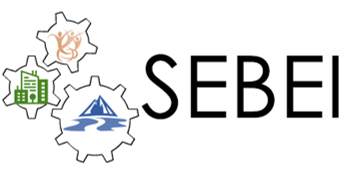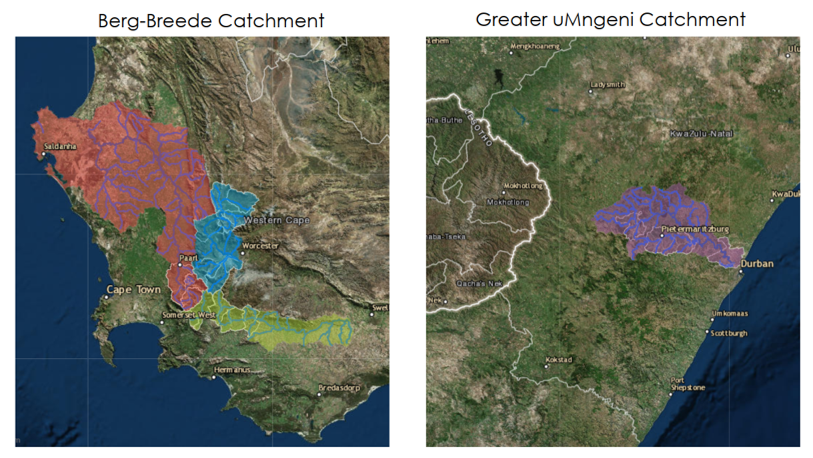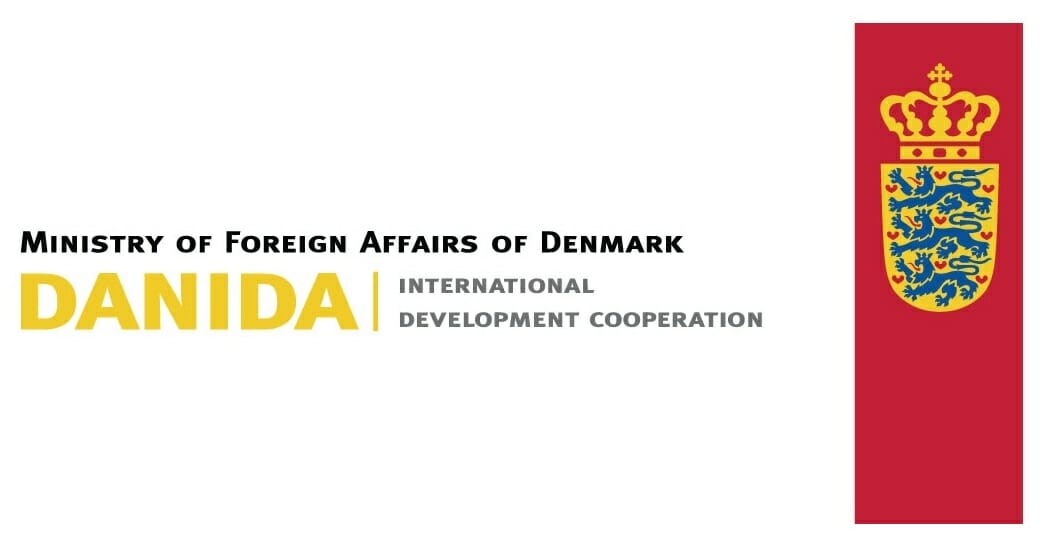| Jump to: Research · Transdisciplinary Learning Network · Project Team · Outputs · Funder |

The overall objective of this innovative, transdisciplinary research project is to develop an evidence-based integrated framework and prototype “investment case” for strengthening water-related Ecological Infrastructure (EI) while: i) supporting well-functioning livelihood strategies/value chains; ii) creating new livelihood opportunities and value chains; and iii) reducing hydroclimatic risks.
Started in July 2018, SEBEI aims to generate new knowledge by combining livelihoods and value chain analysis with an EI approach to water management and next-generation hydroclimatic modelling at optimal spatial resolution (see our work packages). With this combined approach, our interdisciplinary project team will focus on developing a more sophisticated conceptualisation of the linkages between EI and livelihoods. Hence, we will investigate how people might benefit from a strengthened and cost-effective water supply system realised through optimised restoration and rehabilitation of EI with income-creating co-benefits.
Research

Among the key research questions that we will address are:
-
How might the restoration and sound management of EI create new livelihood opportunities and strengthen existing livelihood portfolios?
-
How do restoration and sound management of EI mitigate against current and future hydroclimatic risks that impact on households, and the broader economy within which they are located, in strategic and stressed catchments?
The research design is based on an inter- and transdisciplinary approach pursuing integration and scaling up.
The Berg-Breede and Greater uMngeni catchments are the focus because they have strategic water sources upstream of large cities (Cape Town, Durban) with strong rural -urban linkages. The catchments have a maximised engineered water supply system with no further Built Infrastructure options available, coupled with deteriorating water quality. We examine six EI intervention sites across these catchments. All sites provide a good representation of existing EI implementation models in terms of partnerships and operational structures.

Transdisciplinary Learning Network
To ensure that the knowledge created in the project is solution -oriented, socially robust and transferable to societal practice, a transdisciplinary learning network (i.e. “Community of Practice”) has been established in each catchment. In addition to researchers, each network will comprise a group of around 25 stakeholders drawn from government, NGOs, conservation agencies, private sector and communities involved in EI interventions in the research catchments. Participatory methods (such as interactive mapping exercises, group model building and using concrete case contexts) will be used to stimulate group learning, knowledge integration and capacity strengthening in the transdisciplinary learning networks, as well as to evaluate gathered knowledge and emerging understanding.
The transdisciplinary learning networks met in November 2018 and April 2019, and for a third time in November 2019. A final workshop is planned for October/November 2020 (date to be announced in September).
Project Team
The project is jointly coordinated by the ACDI and the Department of Geosciences and Natural Resource Management at the University of Copenhagen. Key research partners include the Department of Conservation Ecology and Entomology from Stellenbosch University, the Centre for Water Resources Research at the University of KwaZulu Natal as well as two private sector organisations: Aurecon and Ekosource.
-
ACDI, University of Cape Town
Name
Role
Work Package
Petra Holden
Postdoctoral Researcher
Project coordiantor WP2 leader; Project contact
Stephanie Midgley
WP1 and WP5 Senior Researcher
Mark New
WP3 Leader
Sheona Shackleton
WP4 Senior Researcher
Kevin Coldrey
WP5 Leader
-
Department of Geosciences and Natural Resource Management, University of Copenhagen
Name
Role
Work Package
Niels Fold
Principal investigator - Denmark
Laura Rasmussen
WP1 Leader
Maya Pasgaard
WP4 Research
Rasmus Skov Olesen
WP4 Research
-
Department of Conservation Ecology and Entomology, Stellenbosch University
Name
Role
Work Package
Karen Esler
Restoration Expert
Alanna Rebelo
Postdoctoral Researcher
-
Centre for Water Resources Research, University of KwaZulu Natal
Name
Role
Work Package
Sabine Stuart-Hill
Senior Researcher
Shaeden Gokool
Postdoctoral Researcher
David Clark
Hydrologist
-
Aurecon
Name
Role
Work Package
James Cullis
Private sector partner
Louise Lodenkamper
Private sector partner
-
Ekosource
Name
Role
Work Package
Jason Hallowes
Private sector partner
For more information about the project please contact Nadine Methner at nadine.methner@uct.ac.za or 021 650 5598.
Outputs
- Journal article: Rebelo, A.J., Holden, P.B., Hallowes, J., Eady, B., Cullis, J., Esler, K.J. & New, M. 2022. The hydrological impacts of restoration: A modelling study of alien tree clearing in four mountain catchments in South Africa.
- Popular article: Rebelo, A.J., Esler, K.J., New, M.G. & Holden, P.B. 2022. Removing alien plants can save water: we measured how much.
- Journal article: Holden, P.B., Rebelo, A.J., Wolski, P., Odoulami, R., Lawal, K., Kimutai, J., Nkemelang, T. & New, M. 2022. Nature-based solutions in mountain catchments reduce impact of anthropogenic climate change on drought streamflow.
- Popular article: Holden, P.B., Rebelo, A.J., Wolski, P., Odoulami, R., Lawal, K., Kimutai, J., Nkemelang, T. & New, M. 2022. Clearing alien trees can help reduce climate change impact on Cape Town’s water supply.
- Investment brief: SEBEI Investment Brief 2022. Ecological Infrastructure for Water and Socio-Economic Security
- Journal article: Midgley, S.J., Esler, K.J., Holden, P.B., Rebelo, A.J., Stuart-Hill, S.I., Cullis, J.D. and Methner, N. 2021. Typologies of collaborative governance for scaling nature-based solutions in two strategic South African river systems.
- Journal article: Rebelo, A.J., Gokool, S., Holden, P.B. and New, M.G. 2021. Can Sentinel-2 be used to detect invasive alien trees and shrubs in Savanna and Grassland Biomes?. Remote Sensing Applications: Society and Environment
- Policy brief: SEBEI Policy Brief 2021. How can investment in Ecological Infrastructure increase water security and alleviate poverty?
- Journal article: Rebelo, A.J., Holden, P.B., Esler, K. and New, M.G. 2021. Benefits of water-related ecological infrastructure investments to support sustainable land-use: a review of evidence from critically water-stressed catchments in South Africa
- Journal article: Olesen, R.S., Vang Rasmussen, L., Fold, N., Shackleton, S. 2021 . Direct and indirect socio-economic benefits from ecological infrastructure interventions in the Western Cape, South Africa
- Dataset: Rebelo, A.J., S. Gokool, and P. B. Holden 2021. Mapping Invasive Alien Trees and Shrubs in strategic water source areas in the uMngeni Catchment
- Journal paper: Holden, P., Rebelo A, New, M. 2021. Mapping invasive alien trees in water towers: A combined approach using satellite data fusion, drone technology and expert engagement
- Journal paper: Vang Rasmussen L., Fold, N., Skov Olesen, R., Shackleton, S. 2021. Socio-economic outcomes of ecological infrastructure investments
- Report: Coldrey, KM. 2020. Options for financing EI interventions in South Africa
- Dataset: Rebelo, A., and Holden, P. 2020. Mapping land-use/land-cover in strategic water source areas in the Upper Berg and Breede Catchments
- Dataset: Holden, P., and Rebelo A. 2019. Mapping Invasive Alien Trees in strategic water source areas in the Berg and Breede Catchments
- Popular article: Rebelo, A. and Methner, N. 2019. Protecting our water-related ecological infrastructure by building an investment case. Waterwheel 18(5): 29-33.
- Working paper: Rebelo, A. and Holden, P. 2018. SEBEI Study Site Descriptions (original study sites)
- The SEBEI team produced a map of invasive alien trees/shrubs in the uMngeni Catchment which you can view in this app. Mapped from Sentinel2 imagery in four broad categories: pine, gum, wattle and Bugweed, at a 20 m resolution. The dataset can be downloaded from the outputs in the list above.
Funder
